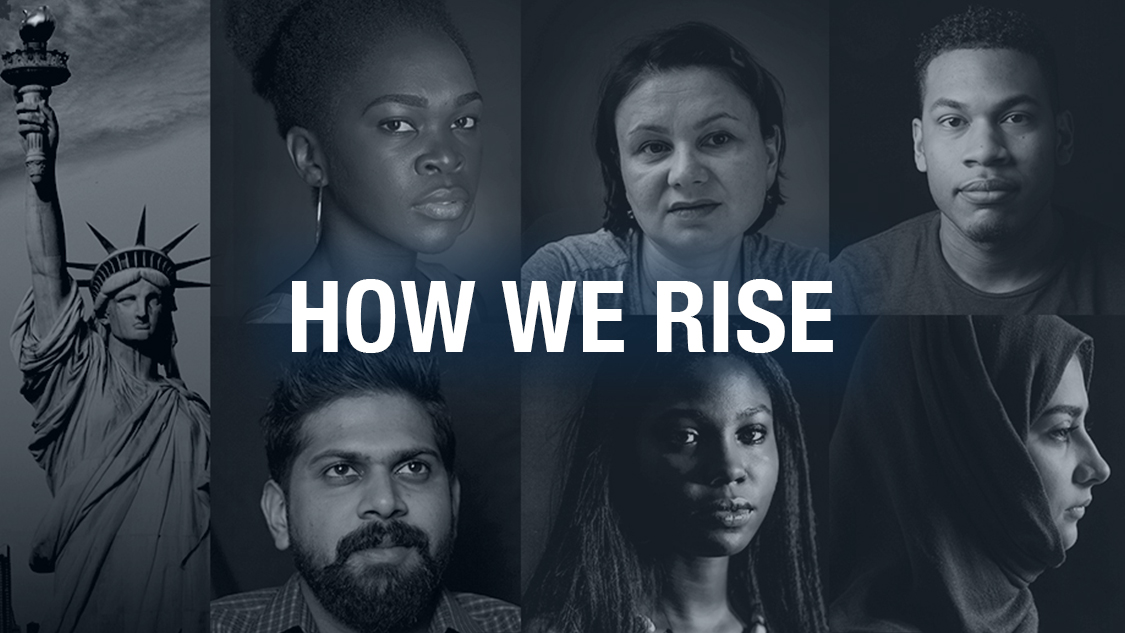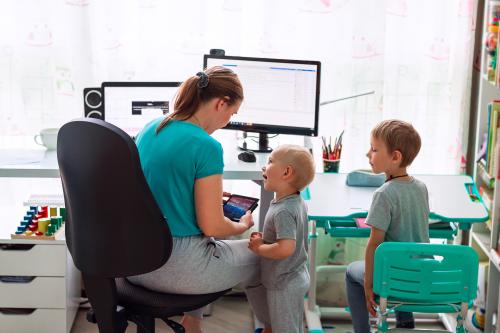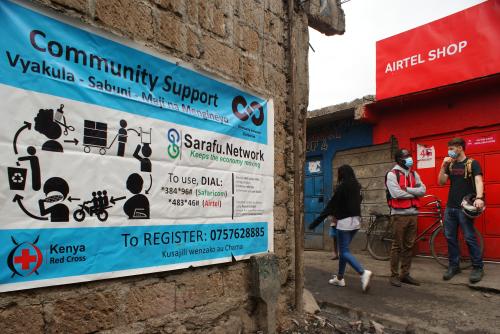COVID-19 has changed American life dramatically. Americans were isolated for much of the pandemic. Many contracted COVID-19 and American families lost over 975,000 loved ones. Millions lost their jobs and often, their employer-sponsored healthcare. 31.6 million people had to go to work to provide the rest of us with frontline services, while others worked from home. Schools converted to online instruction. Parents struggled to juggle childcare and work. First responders and medical care providers worked overtime in the most hopeless context to save the lives that they could save. Life expectancy decreased, particularly for Black and Latino Americans.
In a recent Brookings survey fielded by IPSOS from March 11-20, 2022, we asked 1,015 respondents about some of the more subtle but enduring ways in which COVID-19 has altered their lives over the last two years. (Download the survey data filtered by age and income here; download the survey data filtered by gender, race, and employment here.) We surveyed Americans about their support networks since the beginning of the pandemic, their sense of control over their lives, and what help they still needed to be able to support the aspirations of their families.
What we found was that the pandemic has been particularly difficult for women, young people, and Black and Latinx Americans. These groups and people earning less than $50,000 annually are particularly in need of policies that support improved well-being. Here are three important insights into some of the more enduring experiential effects of over two years of American life with COVID-19.
Experiencing a loss of control over life
First, the most important and disturbing finding from our survey is that many Americans have lost a sense of control over their lives. This was particularly true for women, 26% of whom responded that they felt they had less control over their lives. This result held even for women who did not have children in their homes, a fact which raises questions about what other factors may be contributing to women’s sense of loss of control. Interestingly, white women (almost 28%) were more likely to report a loss of control than were Black women (almost 13%) or Latinas (20%). The feeling of loss of control was also true of almost 30% of young people ages 18-34 years old.
Men were not far behind in feeling a loss of control over their lives. About 19% of our male respondents reporting feeling less control over their lives, and this result largely held regardless of whether or not there were children in the household. While 25% of Latinos reported a loss of control over their lives, 18% of white men felt the same way and slightly more than 6% of Black men reported a similar perception.
Families still need support
Second, we found that Americans feel they need more help to support the aspirations of their families. The top three needs were income, healthcare, and quality jobs. We also note that Black women reported needing more food support than others we surveyed.
Slightly over half (53%) of our sample indicated that they needed more income. As one might expect, this result was most acute for people earning less than $25,000 (63% indicated this as a needed support) but there was still a significant need among the nearly 50% of our respondents who earned $75,000 or more. Sixty percent of Black and Latinx respondents also indicated a need for more income.
The pandemic has certainly highlighted the gaps in our healthcare and public health infrastructure. Our survey bears this out as Americans indicate that they continue to struggle with adequate healthcare. About 20% of our Black and 27% of our Latinx respondents indicated that they needed better healthcare to support their families. Thirty percent of people 18-34 years of age and 25% of those earning less than $50,000 also stated a need for better healthcare.
As we know, the pandemic was also particularly devastating, in its early phases, for those living in crowded quarters. We found that adequate housing remains a challenge for Black and Latinx households in particular, with about 18% of Black and 22% of Latinx respondents identifying better housing as a needed support.
In the earliest months of the pandemic, many millions of Americans experienced food insecurity. In our survey, a disturbing 18% of Black women reported continuing to need support for adequate food, the highest in our sample.
Finding a quality job was challenging before the pandemic began. In our survey, Latinx respondents reported the highest need for a quality job, with nearly 30% indicating that as a needed support. Nearly 18% of the Black women in our sample also reported needing a quality job to support their families’ aspirations. Everyone needs a quality job, but it is clear that two years into the pandemic, that need is most acute for Latinx and Black households.
Overall, increased income, healthcare, quality jobs, and better housing remain important needs for American households, particularly for Latinx and Black families and low-income Americans.
Support networks have changed, but not as much as we might have expected
Third, we also wanted to know if and why support networks had changed for Americans. What we found here was somewhat reassuring. For 66% of the people we surveyed, support networks were largely unchanged. Of the 33% for whom there were changes, half reported changes in their support network were due to families experiencing health, financial, or childcare/eldercare challenges. One interesting finding about support networks was that almost 20% of the Black women we surveyed reported an improvement in their social networks, as did almost 30% of those between the ages of 18-24. While it is premature to speculate how Americans’ social support networks might change in the new, endemic phase of COVID-19, there is some reason for optimism.
Policy Opportunities
It is not surprising that Americans are changed by more than two years of the COVID-19 pandemic. Supporting Americans to create a new normal will require important support. Our survey indicates there are two ways in which policymakers at every level can contribute to Americans’ greater well-being in the new era of endemic COVID-19.
Many Americans feel they have lost control over their lives and have indicated that they need better healthcare. To address this, policymakers should, first, be prepared improve healthcare access in all communities. Expand Medicaid in those states where there has not been a Medicaid expansion and use ARP funds to ensure low-income communities and communities of color have easily accessible, affordable, quality, and culturally appropriate health and mental healthcare services.
Second, policymakers should use ARP, infrastructure funds, and other investments to ensure plentiful affordable housing with easy, pedestrian access to amenities to improve the availability of quality, family-sustaining jobs.
Our neighbors are telling us where they need help and how to pick up the pieces. Let’s ensure that a post-COVID-19 U.S. is one where everyone, including our most vulnerable, is on the path to healing.
-
Acknowledgements and disclosures
Support for this publication was generously provided by the Annie E. Casey Foundation. The views expressed in this report are those of its authors and do not represent the views of the Foundation, their officers, or employees.
The Brookings Institution is committed to quality, independence, and impact.
We are supported by a diverse array of funders. In line with our values and policies, each Brookings publication represents the sole views of its author(s).








Commentary
COVID-19 takes its toll on American life
March 30, 2022